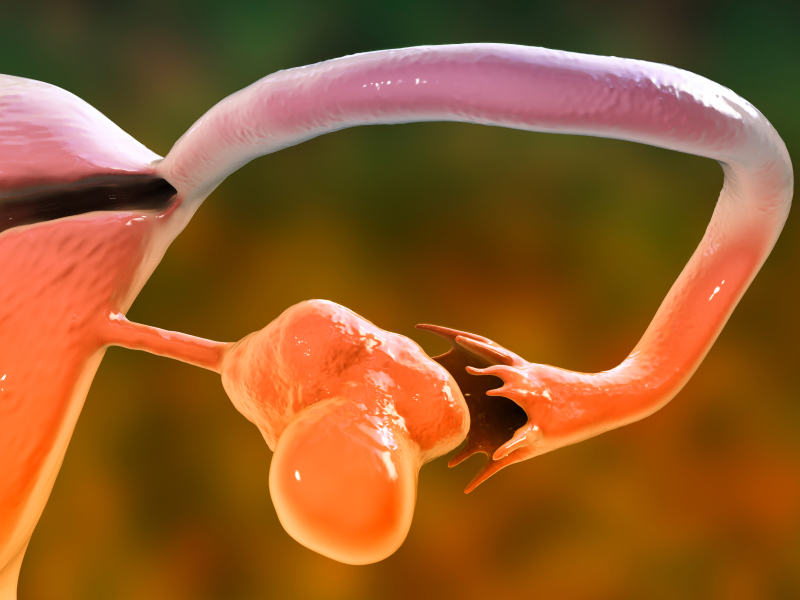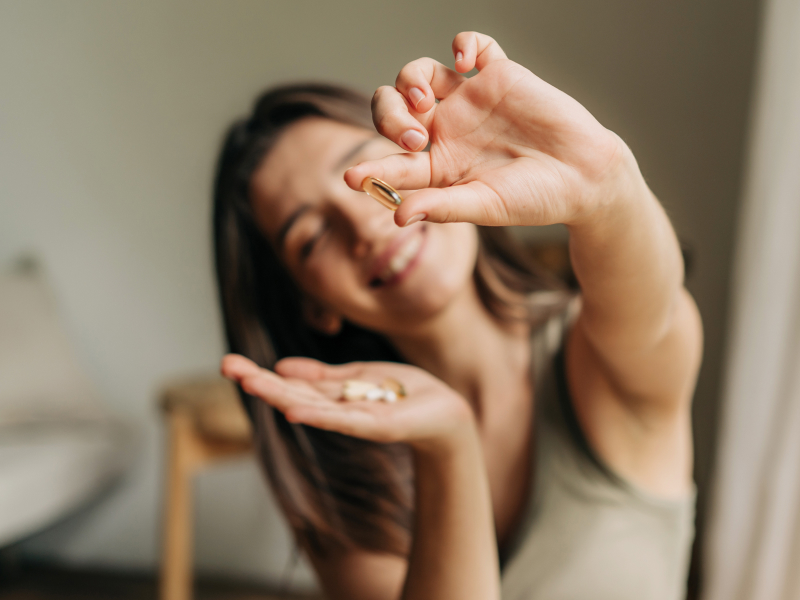How to navigate and manage PCOS with a functional medicine compass.
Polycystic Ovary Syndrome (PCOS) is a common, underdiagnosed condition affecting one out of 10 women of childbearing age. Often misunderstood, it’s more than a reproductive disorder; PCOS is a complex condition that can impact various aspects of a woman’s health and wellbeing.
PCOS is characterized by irregular periods, excess androgens (testosterone and DHEA), and numerous small cysts (fluid-filled sacs) that form in the ovaries.1 In this article, we will investigate in more detail what PCOS is, help you to understand common symptoms, and explore holistic treatment options that can:
- Get your hormones in balance,
- Help regulate your menstrual cycle, and
- Improve your overall energy and vitality.
If you are seeking ways to manage PCOS holistically, you’re in the right place.
What exactly is Polycystic Ovary Syndrome?
PCOS is a hormonal disorder common among women of reproductive age. It’s important to understand that having polycystic ovaries is NOT needed for a diagnosis of PCOS. Some women with PCOS do not have cysts, while some women without PCOS do develop cysts.
If you have PCOS, you may have infrequent or prolonged menstrual periods or excess androgen levels. Your ovaries may develop numerous small collections of fluid and fail to regularly release eggs.

5 most common symptoms of PCOS
Symptoms can range from mild to severe and change over time. And because PCOS symptoms vary from woman to woman, PCOS diagnosis remains a challenge. Consult with your physician if you’re experiencing:
- Irregular menstrual cycles
- Excess body or facial hair growth
- Acne or skin tags
- Weight gain and/or difficult weight loss
- Difficulty conceiving
What’s the emotional impact of living with PCOS?
According to the Mayo Clinic, the exact cause of PCOS is unknown. Early diagnosis and treatment along with weight loss may lower the risk of long-term complications such as type 2 diabetes and heart disease.2
It can be emotionally taxing to live with PCOS. Many women experience feelings of frustration, isolation, anxiety, and low self-esteem due to the visible symptoms and fertility issues associated with the condition.
If you are dealing with these types of feelings in relation to a PCOS diagnosis, know that you are not alone. Your feelings are valid and important. It is so important to find a healthcare provider who can support you through the ups and downs of navigating PCOS.

5 Holistic Treatments for Managing PCOS:
Treating PCOS is more than simply managing its unwelcome, irritating, and what can be frustrating symptoms. Holistic treatment requires addressing the underlying imbalances that contribute to the symptoms with a functional medicine approach.
Central in treating PCOS from a root cause perspective includes:
NW Regen’s functional medicine focuses on the whole person, recognizing that various factors—diet, lifestyle, stress levels, and environmental exposures—interact with our genetic predispositions. While there is no cure for PCOS, here are five ways we can help you to manage PCOS, naturally and holistically:
1. Regulate Menstrual Cycle + Balance Hormones
One of the primary goals in managing PCOS is to regulate the menstrual cycle and ensure hormonal balance. This can often be achieved through a combination of supplements, hormone therapy, dietary changes, and lifestyle adjustments:

Supplements
Certain supplements have been shown to support hormonal balance.
For instance, myo-inositol has been researched for its role in improving ovarian function and insulin sensitivity in women with PCOS.

Nutrition
Increasing protein in the diet helps to regulate blood sugar levels throughout the day which is central in managing PCOS to reduce insulin resistance.
Most women should be aiming for around 80-90g of protein per day, however this is variable and should be discussed with your healthcare provider.
Incorporate a balanced diet rich in colorful fruits, vegetables, lean proteins, and healthy fats.
Reducing intake of processed foods, sugars, and refined carbohydrates can help manage insulin levels and reduce hormonal imbalances.

Progesterone
Since ovulation can be irregular in PCOS, sometimes the hormone progesterone can be low and contribute to symptoms.
In some patients, supplementing with progesterone in the second half of your cycle can be helpful, as progesterone levels increase following ovulation and then decline prior to menstruation.
I call progesterone the “chill” hormone because it interacts with GABA receptors in the brain, which are inhibitory neurotransmitters responsible for rest and relaxation.
2. Reduce Inflammation
Inflammation plays a key role in the exacerbation of PCOS symptoms. Adopting an anti-inflammatory diet can have a profound impact:

Anti-inflammatory Foods: Include foods high in omega-3 fatty acids, such as fish, chia seeds, and walnuts. Antioxidant-rich foods like berries, leafy greens, and nuts can also help reduce inflammation.

Avoid Inflammatory Foods: Minimize consumption of foods that can cause inflammation, including high sugar foods, processed foods, and excessive caffeine and alcohol.
Supplementing with omega 3 fatty acids, NAC, and/or curcumin can be helpful tools for reducing inflammation as well.
3. Reducing Insulin Resistance

Many women with PCOS have insulin resistance, which can lead to weight gain and problems with blood sugar. Addressing insulin resistance is a critical component of PCOS management:
- Low Glycemic Diet: Focus on foods that have a low glycemic index to help maintain steady blood sugar levels. Foods like whole grains, legumes, nuts, seeds, fruits, and vegetables can help improve insulin sensitivity.
- Regular Exercise: Incorporating regular physical activity, especially strength training and high-intensity interval training (HIIT), can improve insulin sensitivity and aid in weight management.
4. Lifestyle Changes
Making certain lifestyle changes can significantly impact PCOS symptoms and overall well-being:
- Stress Management: High stress levels can exacerbate PCOS symptoms. Techniques such as yoga, meditation, and mindfulness can be effective in reducing stress.
- Strength Training: Engaging in strength training exercises 2-3 times a week can help improve insulin resistance, promote weight loss, and increase muscle mass.
- Adequate Sleep: Ensuring you get enough sleep is crucial for hormone regulation. Aim for 7-9 hours of good quality sleep each night.

5. Evidence-Based Supplements
In addition to lifestyle changes, certain supplements have been shown to be effective in managing PCOS symptoms:
- Myoinositol has been effective in enhancing ovarian function, reducing symptoms of hyperandrogenism like acne, and improving metabolic health in PCOS patients, making it a novel method to ameliorate PCOS symptoms.3
- N-Acetylcysteine (NAC), known for its antioxidant properties, has improved ovulation and pregnancy rates when used alongside fertility treatments, offering a low-side-effect profile for PCOS management.4
- Berberine stands out for its ability to improve insulin sensitivity and fertility outcomes, presenting a safe option for premenopausal women seeking pregnancy with minimal side effects.5
Get the support you deserve
Remember, you’re not alone in this journey. Embrace this opportunity to nurture your health! With each small step, you’re paving the way towards a brighter, healthier future.
Just like a garden that thrives with the right care, your body has the incredible ability to heal and flourish when given the attention it deserves. Our community at NW Regen is ready to support you every step of the way. Contact us to set up a consultation. Let’s walk this path together, ready to welcome the transformation that awaits.
1 https://www.hopkinsmedicine.org/health/conditions-and-diseases/polycystic-ovary-syndrome-pcos#
2 https://www.mayoclinic.org/diseases-conditions/pcos/symptoms-causes/syc-20353439
References
Rondanelli, M., Infantino, V., Riva, A., Petrangolini, G., Faliva, M., Peroni, G., Naso, M., Nichetti, M., Spadaccini, D., Gasparri, C., & Perna, S. (2020). Polycystic ovary syndrome management: a review of the possible amazing role of berberine. Archives of Gynecology and Obstetrics, 301, 53 – 60. https://doi.org/10.1007/s00404-020-05450-4.
Kamenov, Z., & Gateva, A. (2020). Inositols in PCOS. Molecules, 25. https://doi.org/10.3390/molecules25235566.
Sandhu, J., Waqar, A., Jain, A., Joseph, C., Srivastava, K., Ochuba, O., Alkayyali, T., Ruo, S., & Poudel, S. (2021). Oxidative Stress in Polycystic Ovarian Syndrome and the Effect of Antioxidant N-Acetylcysteine on Ovulation and Pregnancy Rate. Cureus, 13. https://doi.org/10.7759/cureus.17887.
NW Regen
We offer regenerative and interventional medicine – tailored to empower you with a more vibrant, active lifestyle.


